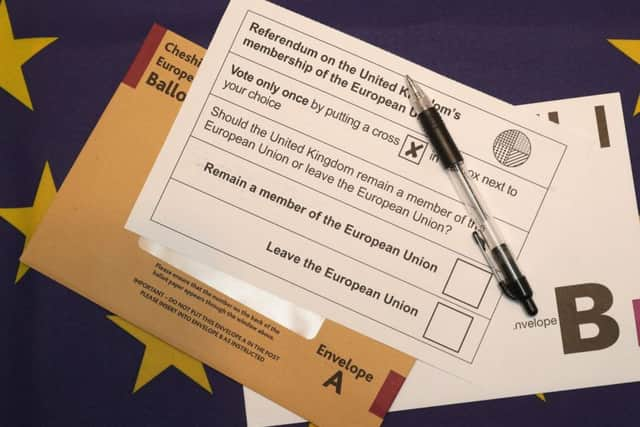EU referendum: the view from EU citizens in Scotland
This article contains affiliate links. We may earn a small commission on items purchased through this article, but that does not affect our editorial judgement.


Tom Harris, the former Labour MP and leader of the Scotland Leave Campaign, said their rights to live and work in Scotland will “remain unaffected” should the majority of voters back Brexit in the EU referendum.
However, uncertainty runs deep among those who moved here from other parts of the EU over their future in Scotland - and the lack of information about the consequences of this month’s vote.
Advertisement
Hide AdAdvertisement
Hide AdLoic Montreuil, 27, is from Normandy, France and moved to Edinburgh two years ago to improve his English. He now works as a communications and marketing officer at inlingua language school, where he took lessons when he first arrived.


Mr Montreuil is not sure his job will survive should Britain vote to leave the EU.
“We welcome students from around the world and the majority of our students are from the EU. My biggest concern about Brexit is that they would have to apply for a visa to get here,” Mr Montreuil said.
He added: “We also deal a lot with European funding through Erasmus so we don’t know what will happen on that front and how it will affect us. We are a bit scared about these things.”


Mr Montreuil said their was further instability on a personal level as his partner works for a French company, but in Scotland.
“We just don’t know what the future holds. Its something we talk about, every week. Maybe I will lose my job after Brexit, maybe my boyfriend will need to go back to France.
“It is such a shame as we love being here and working,” he said.
Mr Montreuil will not have a say in the referendum which could dictate his future given he does not have a British passport, the same scenario faced by around 3m EU citizens living in the UK.
Advertisement
Hide AdAdvertisement
Hide AdLast month, Lord Keen of Elie, the Advocate General for Scotland and the Conservative spokesman for the Home Office in the House of Lords, said there would be “no requirement” in EU law for the rights of EU citizens in the UK to be maintained in light of a Brexit vote.
He said: “The withdrawal process is unprecedented.
“If the UK voted to leave the EU, the Government would do all it could to secure a positive outcome for the country, but there would be no requirement under EU law for these rights to be maintained.”
His comments were described as a government scare story at the time by other strands of the Brexit campaign.
Yesterday, Mr Harris said there was “no suggestion” that EU citizens would be forced to move at all.
He said: “The simple case is that EU citizens and their right to live and work remains unaffected if Britain votes to leave. What would be affected would be future movement between Britain and the EU.”
Mr Harris added: “However, all of that is subject to negotiation.”
A ‘Leave’ vote will lead to around two years of negotiations with the remaining member states as to how Britain will exit the EU.
During this time, arrangements over key issues such as migration and trade are expected to remain the same.
Advertisement
Hide AdAdvertisement
Hide AdFor hospital porter Karol Vrba, 33, of Aberdeen, the prolonged period of uncertainty is a worry as well as any vote to leave the EU being totally unprecedented.
Mr Vrba, who moved to Scotland six years ago, said: “It will be the first situation where one of the countries has decided to go and I am worried about that, that Britain could be the first. There will be new rules on trade, new rules of migration and we don’t know how it will work.
“I think a lot of Polish people here are worried about it. They may have sold their homes in Poland and have mortgages here. I am worried about what will happen. Yes, it comes up in conversation, That is all we can talk about at the moment.”
Around 88 per cent of all migrants arriving in UK live in England with around six per cent settling in Scotland, figures from the ONS show.
EU citizens make up just over 3.2 per cent of Scotland’s population.
Those from Poland make up the biggest proportion of those living in Scotland but born outside the UK.
Around 71,00 people of Polish origin were recorded in 2014, just under one-fifth of the non-UK born population. India (27,00), Germany (20,000), Pakistan (20,000) and Republic of Ireland (17,000) followed.
Poles were also most likely to be in full-time work at 56 per cent compared to the population average of 41 per cent.
Advertisement
Hide AdAdvertisement
Hide AdFigures also highlight that Poles in Scotland have higher-than-average qualifications with 41 per cent having a degree of higher. This compares to 22 per cent of those who class themselves as White Scottish.
DOWNLOAD THE SCOTSMAN APP ON ITUNES OR GOOGLE PLAY
